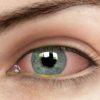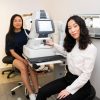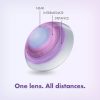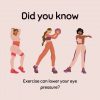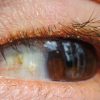We use our eyes every day, which means they are subject to wear and tear. As we age our eyes naturally become more susceptible to common eye diseases such as cataracts, glaucoma and macular degeneration. Scientific studies have shown that a balanced nutritious diet is necessary for optimal ocular function and prevention of eye diseases. The recommended nutritional intake varies from person to person, depending on their medical conditions, food tolerances and age. As such, it is best that you consult your health care provider for advice and guidelines regarding the amount of nutrients necessary to meet your individual needs.
Oxidation is a chemical reaction that can take place in our bodies where a stable molecule is changed to a free radical. Our body naturally produces free radicals during normal metabolic processes. Fortunately, our bodies also produce antioxidants which neutralises the detrimental effects of free radicals. When there is long term imbalance of free radicals and antioxidants, this can lead to tissue damage and chronic diseases such as macular degeneration and diabetic retinopathy.
Production of excess free radicals can be due to lifestyle, diet, medical conditions and exposure to radiation and pollution. As a large portion of free radicals stem from external sources, the production of antioxidants from our body alone may not be able to adequately combat their harmful effects. Luckily, we are able to obtain antioxidants from fruits and vegetables, some of which our body cannot readily produce.
Below, is Table Summary of nutrients required for healthy eyes and food that they can be found in.
| Nutrient | Location in Eye | Food sources |
|---|---|---|
| Beta-carotene | Retina | Carrots, Sweet potatoes |
| Lutein | Macula, Lens | Broccoli, leafy green vegetables, egg yolks |
| Omega-3 fatty acids (DHA & EPA) | Retina, Meibomian gland | Rainbow trout, salmon, sardines, tuna, Avocado, flaxeed |
| Vitamin C | Cornea, Aqueous Humor, Vitreous Humor, Retina, Lens | capsicum, broccoli, citrus fruits, kiwifruit |
| Vitamin D | Cornea | Fortified Milk, Cereal |
| Vitamin E | Retina | Eggs, kiwifruit, Olive Oil, Orange capsicum, nuts, seeds |
| Zeaxanthin | Macula, Lens | Orange capsicum, goji berries |
| Zinc | Retina | Oysters, turkey, red meat, nuts |
Vitamin C (ascorbic acid) is a nutrient our body cannot produce but naturally exists in food such as orange capsicum, broccoli, citrus fruits and kiwifruit. It promotes good health in the cornea, lens, retina and vitreous humor. Vitamin C is an antioxidant. Consumption of vitamin C reduces the risk of developing macular degeneration and cataract.
Vitamin D is another vital antioxidant. We can actually generate our own vitamin D. This occurs when UVB rays from the sun make contact with our exposed skin, causing a chemical reaction that creates vitamin D. Please consult your doctor about the appropriate level of sun exposure for adequate vitamin D production without accelerating cataract or skin cancer growth. We cannot rely on our diet for vitamin D because they exist at low levels in our food sources. Although, vitamin D is becoming more readily available in the form of fortified milk and cereal.
Fatty acids are critical for normal production and function of cells, muscles, organs and nerves and general wellbeing. We cannot produce our own essential fatty acids, but we can get them from the food we eat. There are 2 types of essential fatty acids, Omega 3 fatty acids and omega 6 fatty acids. Our bodies require a fine balance of both for good general health. Omega 3 fatty acids has notable health benefits for the eyes and development of normal vision during infancy. On the other hand, excess consumption of omega 6 fatty acids can lead to heart diseases, cancer and diabetes.
Essential fatty acids are necessary for healthy meibomian glands and maculae and therefore protective against macular degeneration and dry eye syndrome. There have been numerous studies that report significant improvement of symptoms and reduction of inflammation associated to dry eyes. Essential fatty acids also facilitate intraocular fluid drainage, and this reduces the risk of high eye pressure and glaucoma.
Docosahexaenoic acid (DHA) and Eicoapentaenoic acid (EPA) are types of omega 3 fatty acids. The best food sources for omega 3 fatty acids are cold water fish such as sardines, herring, salmon and tuna. Wild caught are preferred over farmed fish, because they tend to have less pollutants and chemicals. Alpha-Linolenic Acid (ALA) is a plant based omega fatty 3 acids, that can be found in flaxeeds, walnuts and dark leafy green vegetables. Flaxeed is known to be better digested and absorbed in crushed form by the younger population. Our bodies converts ALA to DHA and EPA but the process is inefficient and could lead to inadequate levels of DHA and EPA.
Lutein, Zeaxanthin are carotenoids, which are types of pigment that give plants their colour. In the eye, they prevent harmful blue light from reaching the underlying retina, which acts as an antioxidant by reducing generation of free radicals and oxidative damage. It is beneficial to have high concentrations of these pigments at the macula to reduce the risk of developing macular degeneration. Carotenoid rich foods include green leafy vegetables and yellow vegetables, kale, spinach and egg yolks.
Beta-carotene is a carotenoid that gives rockmelon, apricots, carrots and sweet potatoes their orange colour. The body converts beta-carotene to vitamin A, which the retina uses to create visual signals. It is not recommended to be taken in as a supplement form to prevent age related macular degeneration as they compete with lutein and zeaxanthin for absorption by the body and some studies have also indicated an increased risk of lung cancer in smokers or ex-smokers.
Eating a balance diet with lots of fruits and vegetables is the best way to provide your body with nutrients to heal, reduce inflammation and function at optimum capacity. Dietary supplements do not replace a balanced diet but may be necessary when individuals are not receiving theses nutrients through their diet.
Tips for a nutritious diet to improve eye health:
- Use cooking oils with low levels of omega 6 fatty acids
- Eat fish, fruits, vegetables
- Avoid processed foods
- Avoid fried foods
- Eat less red meat
